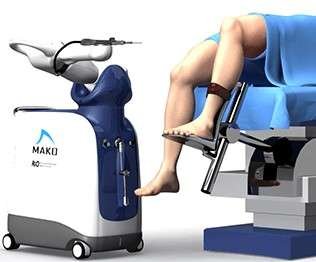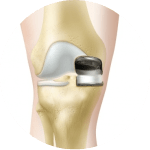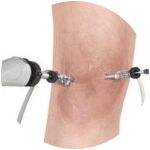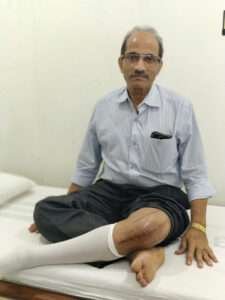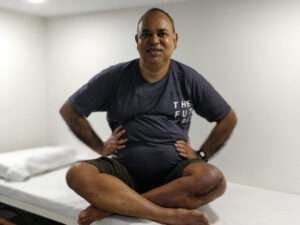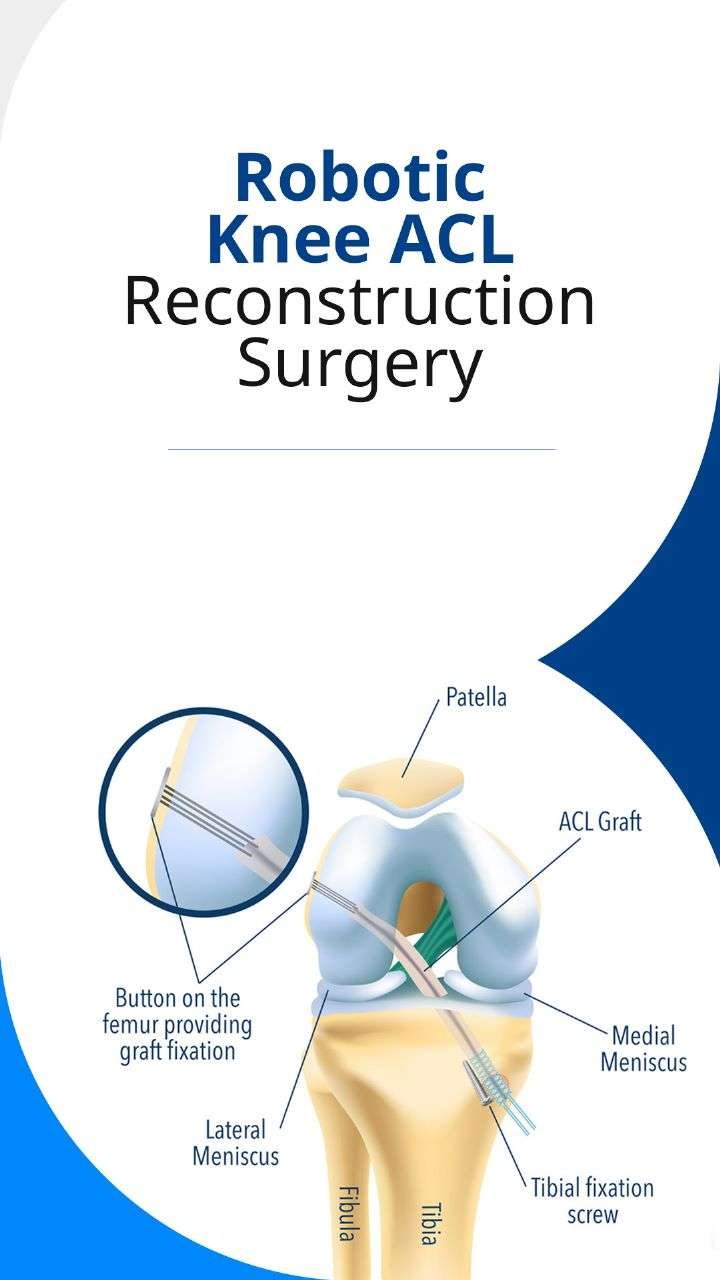
Revolutionizing Robotic Knee ACL Reconstruction Surgery with Robotic-Assisted Techniques
Introduction
Advancements in medical technology have brought about transformative changes in the field of orthopedic surgery. Among these innovations, robotic-assisted techniques have emerged as a groundbreaking approach to various orthopedic procedures, including knee surgeries. Robotic Knee ACL reconstruction surgery is one such procedure that has been significantly enhanced by the integration of robotic technology. This article delves into the revolutionary impact of robotic-assisted techniques on knee ACL reconstruction surgery, highlighting the benefits, advancements, and the role of top orthopedic surgeons in places like Thane.
Robotic Knee ACL Reconstruction Surgery: A Brief Overview
Knee ACL reconstruction surgery is a commonly performed procedure to address injuries to the anterior cruciate ligament, a critical stabilizing structure in the knee joint. Traditionally, this surgery involved open or arthroscopic techniques, where surgeons manually reconstructed the damaged ligament using grafts from the patient’s own tissue or donor tissue. However, these traditional methods were associated with limitations such as variability in graft placement, longer recovery times, and potential errors in aligning the graft accurately.
Enter Robotic-Assisted Techniques
The introduction of robotic-assisted techniques has revolutionized knee ACL reconstruction surgery by addressing these limitations. Robotic systems use advanced imaging, computer algorithms, and precise robotic arms to assist surgeons in achieving unparalleled accuracy and precision during the procedure. This technology enhances the surgeon’s ability to plan, execute, and monitor the surgery in real-time.
Key Advantages of Robotic-Assisted Knee ACL Reconstruction Surgery
1.Enhanced Accuracy and Precision
Robotic systems allow for meticulous preoperative planning and intraoperative guidance, ensuring accurate graft placement and tensioning. This accuracy minimizes errors and reduces the risk of complications, leading to better outcomes for patients.
2.Customized Treatment Plans
With the assistance of robotic technology, surgeons can create personalized treatment plans based on the patient’s anatomy and specific injury. This tailoring of the surgical approach contributes to improved patient satisfaction and long-term results.
3.Minimally Invasive Technique
Robotic-assisted techniques often employ minimally invasive approaches, such as arthroscopy, which involve smaller incisions, reduced tissue damage, and quicker recovery times compared to traditional open surgeries.
4.Faster Recovery
Due to the minimally invasive nature of robotic-assisted knee ACL reconstruction surgery, patients experience reduced pain, shorter hospital stays, and quicker return to daily activities, sports, and work.
5.Real-time Feedback
Robotic systems provide real-time feedback to the surgeon during the procedure, helping them make informed decisions and adjustments for optimal graft placement and tensioning.
Robotic Knee Replacement Surgery and Its Relevance
While robotic-assisted knee ACL reconstruction surgery has garnered significant attention, it’s important to highlight the broader impact of robotic technology on orthopedics. Robotic Knee Replacement Surgery , another notable application, has transformed the field of knee arthroplasty.
Robotic Knee Replacement surgery involves the use of robotic systems to aid orthopedic surgeons in performing total or partial knee replacements. The technology assists in precise bone preparation, implant positioning, and alignment, which are critical factors for the long-term success of knee replacement surgeries.
Conclusion
The integration of robotic-assisted techniques in knee ACL reconstruction surgery and knee replacement surgery has marked a paradigm shift in the field of orthopedics. This technological advancement has not only revolutionized surgical precision but has also translated into enhanced patient outcomes and accelerated recovery periods. By combining the expertise of top orthopedic surgeons with cutting-edge robotic technology, patients can now experience a level of care that was previously unimaginable.
In places like Thane, where access to quality medical care is of paramount importance, the role of skilled professionals like Dr. Bakul Arora at the Arora Clinic cannot be overstated. As a top orthopedic surgeon in Thane , Dr. Bakul Arora’s dedication to staying at the forefront of medical innovation ensures that patients receive the highest standard of care possible. The availability of robotic knee replacement surgery in Thane , under the guidance of experts like Dr. Arora, signifies a new era of healthcare excellence, offering patients the opportunity to regain their mobility and quality of life.
Looking ahead, the collaboration between advanced technology and experienced medical practitioners will continue to shape the landscape of orthopedic surgery. As the field evolves, patients can be confident that they are receiving the best possible care, thanks to the contributions of visionaries like Dr. Bakul Arora and the transformative potential of robotic-assisted techniques.
FAQS
Robotic Knee ACL Reconstruction Surgery is an advanced surgical procedure that utilizes robotic-assisted technology to repair or replace a torn or damaged Anterior Cruciate Ligament (ACL) in the knee joint. The robotic system aids surgeons in achieving more precise and accurate placement of grafts, ultimately enhancing the overall outcome of the surgery.
Traditional ACL surgery involves manual techniques for drilling bone tunnels and graft placement. In contrast, Robotic Knee ACL Reconstruction Surgery incorporates a robotic-assisted system that allows for meticulous planning and execution of the procedure. This advanced technology provides greater surgical accuracy and may result in improved long-term stability and functional outcomes for patients.
The benefits of Robotic Knee ACL Reconstruction Surgery include:
- Enhanced surgical precision and accuracy
- Customized planning based on each patient’s unique knee anatomy
- Potentially reduced risk of graft misplacement
- Improved post-operative knee stability
- Faster recovery and rehabilitation timelines
The eligibility for Robotic Knee ACL Reconstruction Surgery depends on various factors, including the extent of the ACL injury, the patient’s activity level, overall health, and their commitment to post-operative rehabilitation. An orthopedic surgeon will conduct a thorough evaluation and discuss the most appropriate treatment plan for each individual.
The duration of Robotic Knee ACL Reconstruction Surgery may vary depending on the complexity of the case and the patient’s specific needs. On average, the procedure may take around 1 to 2 hours.
After the surgery, patients will undergo a structured rehabilitation program, which is essential for the successful recovery and long-term outcomes. Physical therapy and exercises will help regain knee strength, flexibility, and stability. The total recovery time may range from several months to a year, depending on individual healing and progress.
Yes, one of the primary goals of Robotic Knee ACL Reconstruction Surgery is to restore knee stability and function, enabling patients to return to their desired activities and sports with reduced risk of further knee injuries. However, the timing of returning to sports will be determined by the surgeon based on individual healing progress and rehabilitation success.
As with any surgical procedure, there are inherent risks involved. Potential risks include infection, bleeding, blood clots, nerve or blood vessel damage, and adverse reactions to anesthesia. However, the use of robotic-assisted technology aims to minimize these risks by improving surgical accuracy.
Patients may experience initial improvements in knee stability and function within a few weeks after the surgery. However, complete recovery and return to pre-injury levels of activity may take several months, and individual results may vary.
In most cases, Robotic Knee ACL Reconstruction Surgery is covered by insurance if it is deemed medically necessary. However, it is essential to check with your insurance provider to understand your specific coverage and any pre-authorization requirements.
Thank You "Times Group" for felicitating Arora Clinic for "Excellence in Patient Care"
We are really honored to receive this and we will continue to serve the society better than ever We aim to provide the world-class Knee/Hip Replacement Surgical (Minimal Invasive Surgery) treatment to every patient suffering from knee or hip pain and at the same time make their life pain-free and happy.
Our Services
Are you looking for Best Knee Replacement Surgeon?
Then you are at Right Place
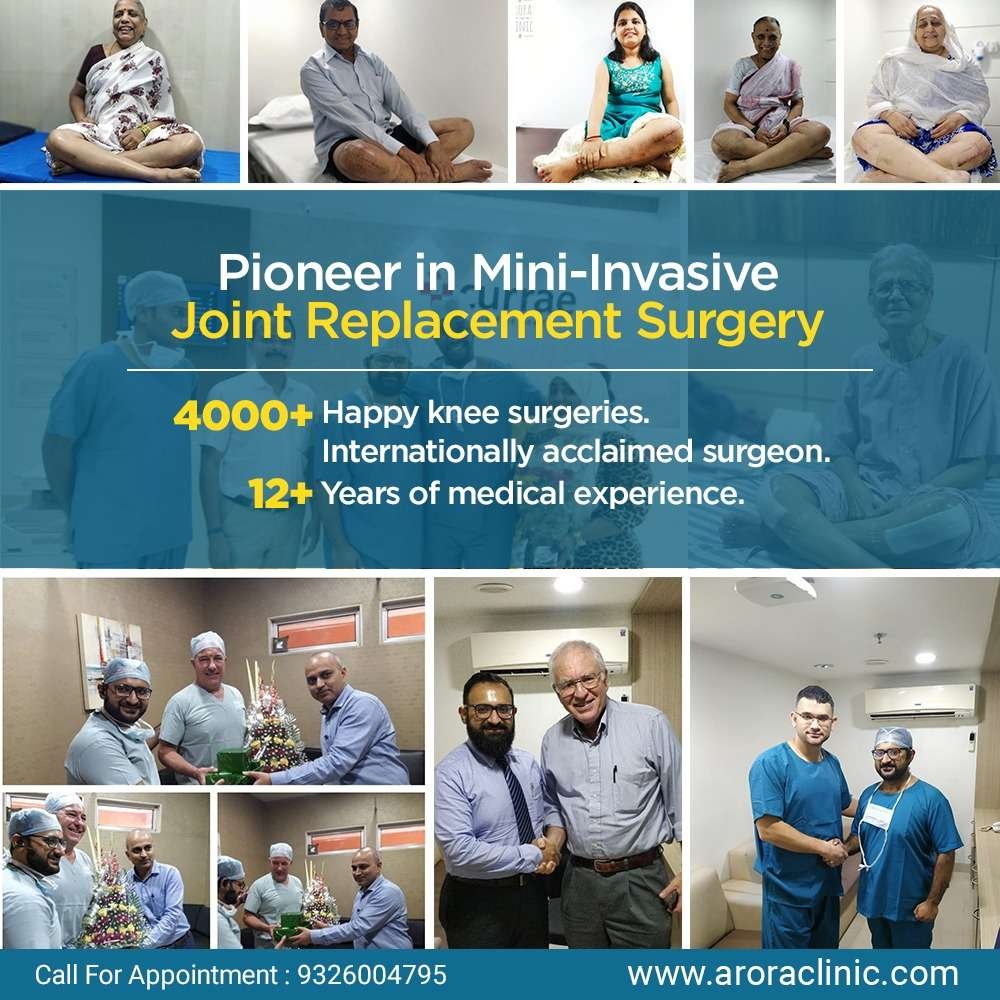
Dr. Bakul Arora’s Joint Replacement Clinic is also known as “Arora Clinic” which is located at Hiranandani Meadows in Thane, within a very convenient proximity to Mumbai. Arora Clinic dedicated clinic for Knee Replacement surgery and all kinds of Orthopaedic treatments and surgeries
The Arora Clinic is one of the most advanced Orthopaedic clinic in Thane region and dedicated to providing the best, personalised healthcare with a breadth of surgical and medical expertise. Arora Clinic offers the modern surgical treatments like “Minimally Invasive Knee Replacement Surgery” which is also called as “PAIN-LESS SURGERY” for any complex knee diseases.
About Surgeon
Dr. Bakul Arora is a Consultant Joint Replacement & Orthopaedic Surgeon is one of the leading Knee Replacement Surgeon in Thane and Mumbai with over 4000+ successfully surgeries. Dr. Bakul Arora specialises in Mini-invasive techniques which offer multiple benefits to patients. He does the surgery using Subvastus approach for Knee Replacement surgery and Direct Anterior Approach for Hip replacement Surgery . This new techniques has many advantages for patients like its pain-less , stich-less surgery, patients walks on the same day after surgery, no blood loss, faster recovery etc.


Patients Review on Arora Clinic
International Patients Videos
FAQS
Knee replacement is required for advanced arthritis of the knee joint, producing painful limitation of movements and restriction in activities of daily living. Knee replacement as a solution should be offered when all non–surgical methods of treatment failed and painkiller medicines and injections also failed to reduce the Knee and hip pains.
Knee replacement can be total or unicondylar, depending on the number of compartments involved. Among the total knee replacement, there are two popular designs- Cruciate Retaining, and Posterior Stabilized. The decision for the design is best taken by the operating orthopedic surgeon based on the integrity of ligaments. Patella resurfacing as a routine is a debatable subject.
Yes, most knee replacement surgeries are minimally invasive, with numerous benefits to the patient, including smaller incisions, less tissue trauma, bleeding and post–operative pain, shorter hospital stays, faster recovery, and earlier return to work and activities — in weeks rather than months. Advantages of Minimally Invasive Knee Replacement Surgery. Patients Start walking in few hours of surgery. Patients start climbing the staircase from second day of his surgery. Patients Discharge with in 3 Days from the Hospital after surgery. No blood loss during the surgery, no blood Transfusion required. Less Physiotherapy.( No Physiotherapist required for home) Less Antibiotic. Stitchless Surgery. Recovery time is just two – three week.
Bilateral knee replacement in the same sitting, can be performed if both the knee joints are damaged to the same extent, however, the medical condition of the patient, and bone quality must be kept in consideration.
Surgery through Minimally Invasive technique patients start walking on the same day and staircase climbing starts from the second day of surgery. Patients can resume his work after 3 – 4 week.
The most significant risks include Infection, Deep vein thrombosis,and Aseptic loosening of implants. The risks correlate with the co-morbid medical condition, and must be discussed with the patient before surgery.
Patients normally require hospitalization for 3-4 days in single knee replacement, and up to 5-6 days in both knee replacement surgery
A single knee replacement takes approximately 90 min- 2 hours. Both knee replacement surgery takes approx 2-3 hours.
Years ago, knee replacement surgery was reserved for elderly patients due to a high complication rate and lack of implant durability. Modern techniques have allowed orthopaedic surgeons to base surgical decisions on a patient’s pain and disability, and not necessarily chronological age. Most patients who undergo knee replacement are between the ages of 50 and 80, but surgeons evaluate patients individually and primarily on their physiologic age and demands.
Patients can resume his/her light work after discharge from the hospital, no need for rest.
Patients are given epidural anesthesia for surgery, and post op pain relief. They are expected to follow instruction from physiotherapist regarding muscle training.
News Events


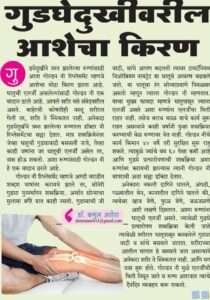

Locate Our Clinic
OUR HOSPITAL PARTNERS
MUMBAI
⇒ Wockhardt Hospital Mumbai Central, Mira road & Vashi
⇒ Apollo Spectra Hospital, Tardeo and Chembur
⇒ Cloud 9 Hospital, Malad
⇒ Criticare Hospital, Andheri
THANE
⇒ Arora Clinic, Hiranandani Meadows
⇒ Bethany Hospital, Vasant Vihar
⇒ Currae Hospital, Kapurbawdi
⇒ Horizon Hospital, Ghodbunder
⇒ Infinity Hospital, Majiwada
⇒ Lakecity Hospital, Khopat
⇒ Oscar Hospital, Majiwada
⇒ Drone Hospital, Bhiwandi


